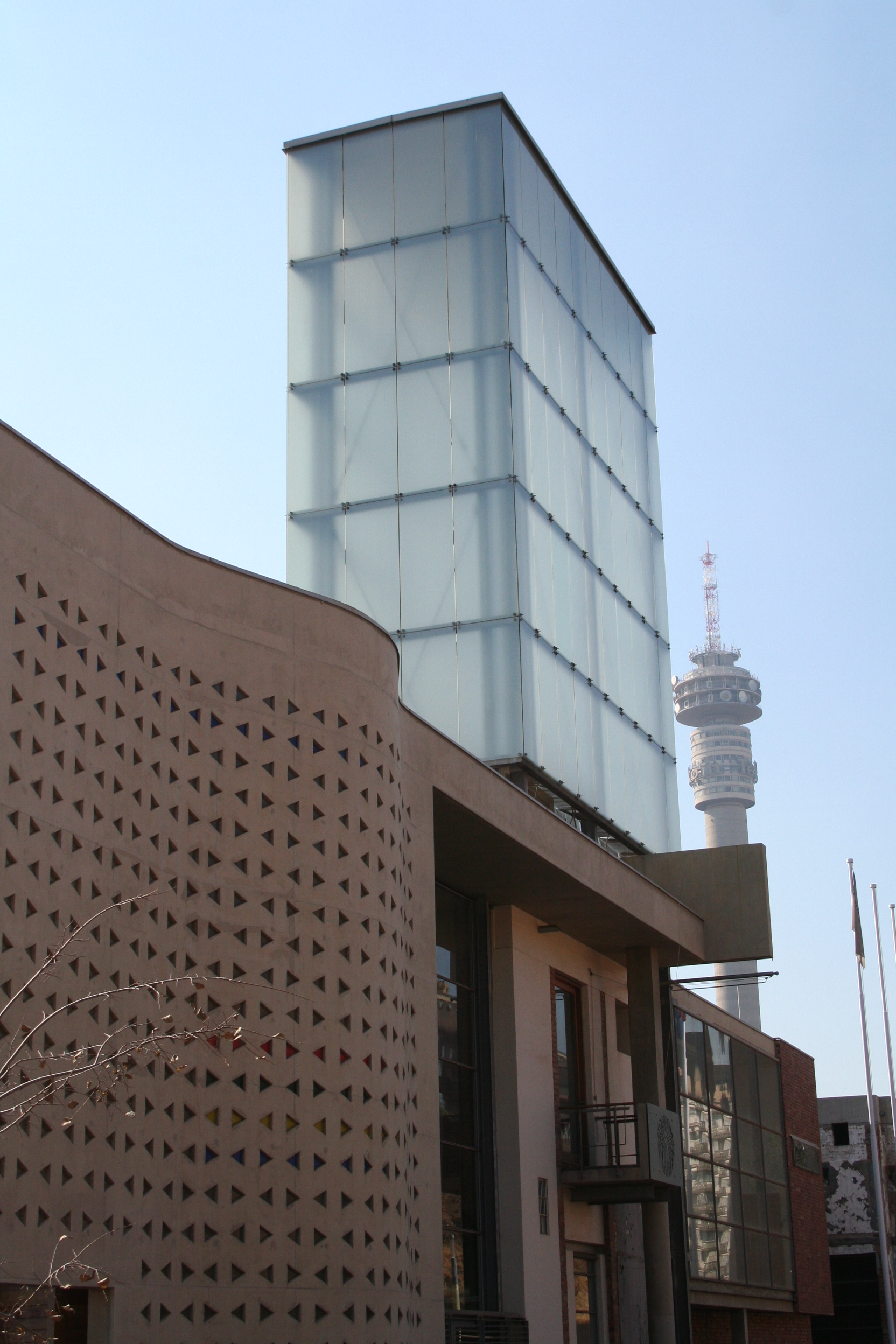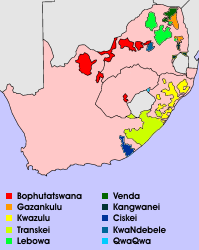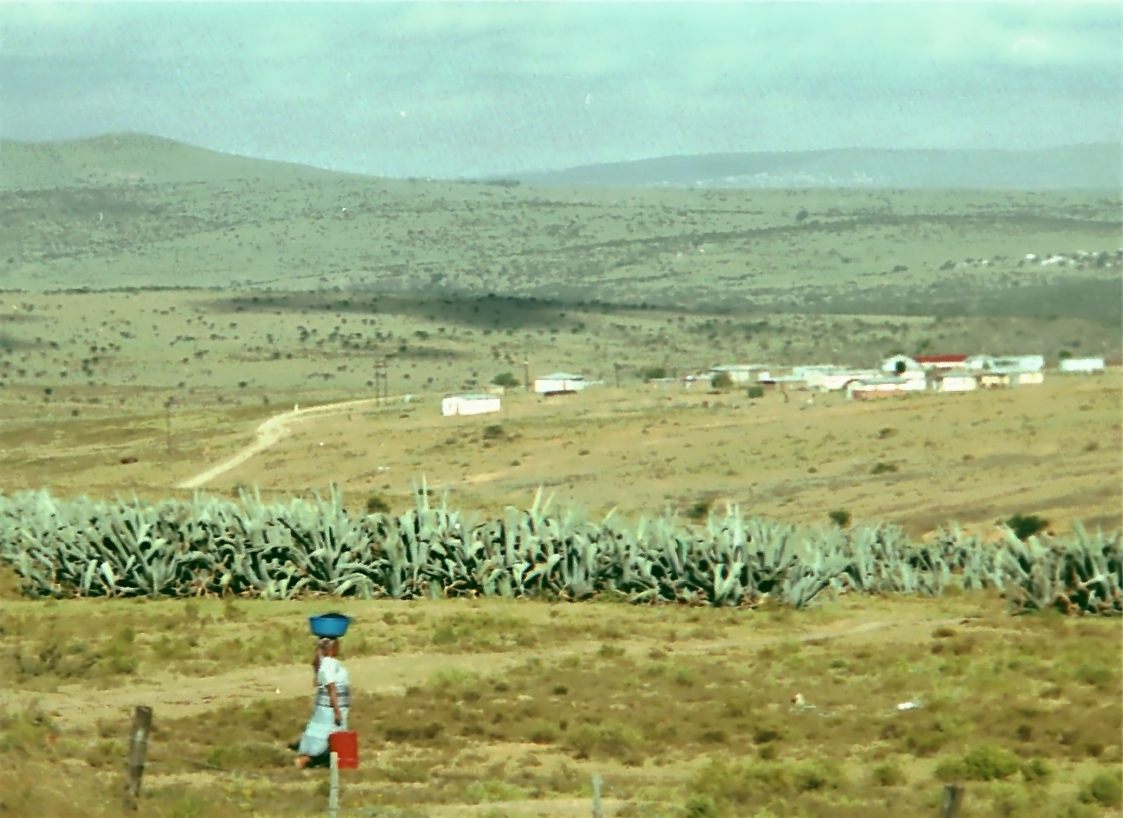|
Transitional Executive Council
The Transitional Executive Council (TEC) was a multiparty body in South Africa that was established by law to facilitate the transition to democracy, in the lead-up to the country's first non-racial election in April 1994. As part of the multi-party negotiations that ended apartheid, the African National Congress (ANC) pushed for the creation of a body that would ensure a level playing field, arguing that the governing National Party would not be impartial, as it would also be contesting the election. The TEC was created by the Transitional Executive Council Act, 1993, and consisted of one member of each of the parties that participated in the negotiations, with the notable exceptions of the Pan Africanist Congress (PAC); and the Freedom Alliance, an alliance of right-wing and black groups such as the Inkatha Freedom Party who had abandoned the negotiation process. The TEC consisted of 19 people, one each from the 19 groups that participated in the negotiations, and it had a ... [...More Info...] [...Related Items...] OR: [Wikipedia] [Google] [Baidu] |
South Africa
South Africa, officially the Republic of South Africa (RSA), is the southernmost country in Africa. It is bounded to the south by of coastline that stretch along the South Atlantic and Indian Oceans; to the north by the neighbouring countries of Namibia, Botswana, and Zimbabwe; and to the east and northeast by Mozambique and Eswatini. It also completely enclaves the country Lesotho. It is the southernmost country on the mainland of the Old World, and the second-most populous country located entirely south of the equator, after Tanzania. South Africa is a biodiversity hotspot, with unique biomes, plant and animal life. With over 60 million people, the country is the world's 24th-most populous nation and covers an area of . South Africa has three capital cities, with the executive, judicial and legislative branches of government based in Pretoria, Bloemfontein, and Cape Town respectively. The largest city is Johannesburg. About 80% of the population are Black Sou ... [...More Info...] [...Related Items...] OR: [Wikipedia] [Google] [Baidu] |
Cyril Ramaphosa
Matamela Cyril Ramaphosa (born 17 November 1952) is a South African businessman and politician who is currently serving as the fifth democratically elected president of South Africa. Formerly an anti-apartheid activist, trade union leader, and businessman, Ramaphosa is also the president of the African National Congress (ANC). Ramaphosa rose to national prominence as secretary general of South Africa's biggest and most powerful trade union, the National Union of Mineworkers. In 1991, he was elected ANC secretary general under ANC president Nelson Mandela and became the ANC's chief negotiator during the negotiations that ended apartheid. He was elected chairperson of the Constitutional Assembly after the country's first fully democratic elections in 1994 and some observers believed that he was Mandela's preferred successor. However, Ramaphosa resigned from politics in 1996 and became well known as a businessman, including as an owner of McDonald's South Africa, chair of t ... [...More Info...] [...Related Items...] OR: [Wikipedia] [Google] [Baidu] |
Political History Of South Africa
The Republic of South Africa is a Unitary state, unitary Parliamentary system, parliamentary democratic republic. The President of South Africa serves both as head of state and as head of government. The President is elected by the National Assembly of South Africa, National Assembly (the lower house of the Parliament of South Africa, South African Parliament) and must retain the confidence of the Assembly in order to remain in office. South Africans also elect Provincial legislature (South Africa), provincial legislatures which govern each of the country's nine Provinces of South Africa, provinces. Since the end of apartheid in 1994 the African National Congress (ANC) has dominated South Africa's politics. The ANC is the ruling party in the national legislature, as well as in eight of the nine provinces (Western Cape is governed by the Democratic Alliance (South Africa), Democratic Alliance). The ANC received 57.50% of the vote during the South African general election, 2019, 20 ... [...More Info...] [...Related Items...] OR: [Wikipedia] [Google] [Baidu] |
1994 Disestablishments In South Africa
File:1994 Events Collage.png, From left, clockwise: The 1994 Winter Olympics are held in Lillehammer, Norway; The Kaiser Permanente building after the 1994 Northridge earthquake; A model of the MS Estonia, which Sinking of the MS Estonia, sank in the Baltic Sea; Nelson Mandela casts his vote in the 1994 South African general election, in which he was elected South Africa's first President of South Africa, president, and which effectively brought Apartheid to an end; NAFTA, which was signed in 1992, comes into effect in Canada, the United States, and Mexico; The first passenger rail service to utilize the newly-opened Channel tunnel; The 1994 FIFA World Cup is held in the United States; Skull, Skulls from the Rwandan genocide, in which over half a million Tutsi people were massacred by Hutu, Hutus., 300x300px, thumb rect 0 0 200 200 1994 Winter Olympics rect 200 0 400 200 1994 Northridge earthquake, Northridge earthquake rect 400 0 600 200 Sinking of the MS Estonia rect 0 200 300 40 ... [...More Info...] [...Related Items...] OR: [Wikipedia] [Google] [Baidu] |
1993 Establishments In South Africa
File:1993 Events Collage.png, From left, clockwise: The Oslo I Accord is signed in an attempt to resolve the Israeli–Palestinian conflict; The Russian White House is shelled during the 1993 Russian constitutional crisis; Czechoslovakia is peacefully dissolved into the Czech Republic and Slovakia; In the United States, the ATF besieges a compound belonging to David Koresh and the Branch Davidians in a search for illegal weapons, which ends in the building being set alight and killing most inside; Eritrea gains independence; A major snow storm passes over the United States and Canada, leading to over 300 fatalities; Drug lord and narcoterrorist Pablo Escobar is killed by Colombian special forces; Ramzi Yousef and other Islamic terrorists detonate a truck bomb in the subterranean garage of the North Tower of the World Trade Center in the United States., 300x300px, thumb rect 0 0 200 200 Oslo I Accord rect 200 0 400 200 1993 Russian constitutional crisis rect 400 0 600 200 Dissolu ... [...More Info...] [...Related Items...] OR: [Wikipedia] [Google] [Baidu] |
Peace Processes
A peace process is the set of sociopolitical negotiations, agreements and actions that aim to solve a specific armed conflict. Definitions Prior to an armed conflict occurring, peace processes can include the prevention of an intra-state or inter-state dispute from escalating into military conflict. The United Nations Department of Peace Operations (UNDPO) terms the prevention of disputes from escalating into armed conflicts as ''conflict prevention''. In 2007, the United Nations Secretary-General's Policy Committee classed both initial prevention of an armed conflict and prevention of the repeat of a solved conflict as peacebuilding. For peace processes to resolve an armed conflict, Izumi Wakugawa, advisor to the Japan-based International Peace Cooperation Program, suggests a definition of a peace process as "a mixture of politics, diplomacy, changing relationships, negotiation, mediation, and dialogue in both official and unofficial arenas", which he attributes to Harold H ... [...More Info...] [...Related Items...] OR: [Wikipedia] [Google] [Baidu] |
Democratization
Democratization, or democratisation, is the transition to a more democratic political regime, including substantive political changes moving in a democratic direction. It may be a hybrid regime in transition from an authoritarian regime to a full democracy, a transition from an authoritarian political system to a semi-democracy or transition from a semi-authoritarian political system to a democratic political system. The outcome may be consolidated (as it was for example in the United Kingdom) or democratization may face frequent reversals (as happened in Chile). Different patterns of democratization are often used to explain other political phenomena, such as whether a country goes to a war or whether its economy grows. Whether and to what extent democratization occurs has been attributed to various factors, including economic development, historical legacies, civil society, and international processes. Some accounts of democratization emphasize how elites drove democratizat ... [...More Info...] [...Related Items...] OR: [Wikipedia] [Google] [Baidu] |
Lucas Mangope
Kgosi Lucas Manyane Mangope (27 December 1923 – 18 January 2018) was the leader of the Bantustan (homeland) of Bophuthatswana. The territory he ruled over was distributed between the Orange Free State – what is now Free State (province), Free State – and North West (South African province), North West Province. He was also the founder and leader of the United Christian Democratic Party, a political party based in the North West (South African province), North West of South Africa. Education Mangope attended an Anglican mission school for most of his school career. He matriculated from St. Peter's College, Rosetenville in Johannesburg in 1946. After matric, he registered for a Junior Teaching Diploma at the Diocesan Teachers' Training College in Polokwane (then called Pietersburg). He studied towards a Higher Primary Teacher’s Diploma at Bethel College in the Transvaal from 1951. After graduating he started teaching and specialised as an Afrikaans teacher. He taught at seco ... [...More Info...] [...Related Items...] OR: [Wikipedia] [Google] [Baidu] |
Boputhatswana
Bophuthatswana (, meaning "gathering of the Tswana people"), officially the Republic of Bophuthatswana ( tn, Riphaboliki ya Bophuthatswana; af, Republiek van Bophuthatswana), was a Bantustan (also known as "Homeland"; an area set aside for members of a specific ethnicity) that was declared (nominally) independent by the apartheid regime of South Africa in 1977. However, its independence, like the other Bantustans (Ciskei, Transkei and Venda) was not recognized by any country other than South Africa. Bophuthatswana was the second Bantustan to be declared an independent state, after Transkei. Its territory constituted a scattered patchwork of enclaves spread across what was then Cape Province, Orange Free State and Transvaal. Its seat of government was Mmabatho, which is now a suburb of Mahikeng. On 27 April 1994, it was reintegrated into South Africa with the coming into force of the country's interim constitution. Its territory was distributed between the new provinces of the ... [...More Info...] [...Related Items...] OR: [Wikipedia] [Google] [Baidu] |
Ciskei
Ciskei (, or ) was a Bantustan for the Xhosa people-located in the southeast of South Africa. It covered an area of , almost entirely surrounded by what was then the Cape Province, and possessed a small coastline along the shore of the Indian Ocean. Under South Africa's policy of apartheid, land was set aside for black peoples in self-governing territories. Ciskei was designated as one of two homelands, or "Bantustans", for Xhosa-speaking people. Xhosa people were forcibly resettled in the Ciskei and Transkei, the other Xhosa homeland. In contrast to the Transkei, which was largely contiguous and deeply rural, and governed by hereditary chiefs, the area that became the Ciskei had initially been made up of a patchwork of "reserves", interspersed with pockets of white-owned farms. In Ciskei, there were elected headmen and a relatively educated working-class populace, but there was a tendency of the region's black residents—who often worked in East London, Queenstown, a ... [...More Info...] [...Related Items...] OR: [Wikipedia] [Google] [Baidu] |
Bantustans
A Bantustan (also known as Bantu homeland, black homeland, black state or simply homeland; ) was a territory that the National Party administration of South Africa set aside for black inhabitants of South Africa and South West Africa (now Namibia), as part of its policy of apartheid. By extension, outside South Africa the term refers to regions that lack any real legitimacy, consisting often of several unconnected enclaves, or which have emerged from national or international gerrymandering.Macmillan DictionaryBantustan, "1. one of the areas in South Africa where black people lived during the apartheid system; 2. SHOWING DISAPPROVAL any area where people are forced to live without full civil and political rights." The term, first used in the late 1940s, was coined from Bantu' (meaning "people" in some of the Bantu languages) and ''-stan'' (a suffix meaning "land" in the Persian language and some Persian-influenced languages of western, central, and southern Asia). It subseq ... [...More Info...] [...Related Items...] OR: [Wikipedia] [Google] [Baidu] |
State President Of South Africa
The State President of the Republic of South Africa ( af, Staatspresident) was the head of state of South Africa from 1961 to 1994. The office was established when the country became a republic on 31 May 1961, albeit, outside the Commonwealth of Nations, and Queen Elizabeth II ceased to be Queen of South Africa. The position of Governor-General of South Africa was accordingly abolished. From 1961 to 1984, the post was largely ceremonial. After constitutional reforms enacted in 1983 and taking effect in 1984, the State President became an executive post, and its holder was both head of state and head of government. The State President was appointed by both Houses of the Parliament of South Africa ( Senate of South Africa and the House of Assembly of South Africa) in the form of an electoral college. The office was abolished in 1994, with the end of Apartheid and the transition to democratic majority rule. Since then, the head of state and head of government is known s ... [...More Info...] [...Related Items...] OR: [Wikipedia] [Google] [Baidu] |







